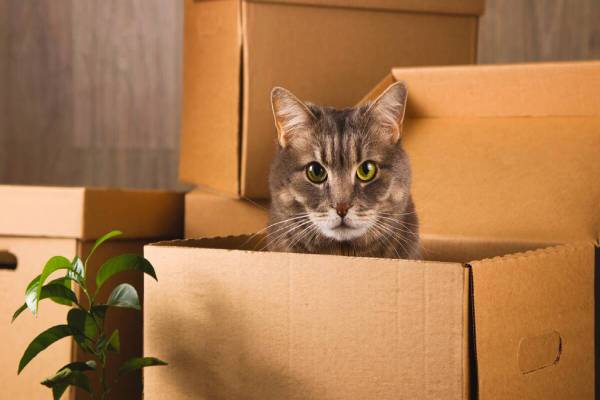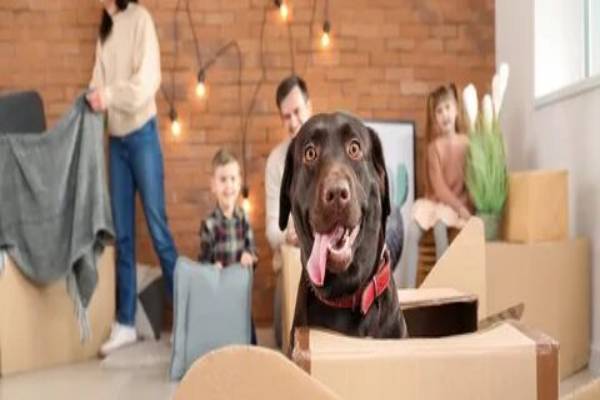Moving with pets can be challenging, but with proper planning, you can make the experience less stressful for both you and your furry companions. Moving with pets can be a challenging task, as it requires careful planning and attention to their unique needs. Unlike humans, pets can find the process overwhelming and stressful, because they are highly sensitive to changes in their environment. From the unfamiliar sights and sounds of the journey to adjusting to a new home, every step of the move can impact their well-being. However, with the right strategies and preparations, you can turn what might feel like a hard experience into a manageable one for both you and your pet.

Moving Cross Country with Different Kinds of Pets
Moving cross country with pets can be a complex process, especially when different animals have unique needs and considerations. Whether you have cats, dogs, birds, or other pets, it’s essential to plan carefully to ensure a stress-free experience for both you and your furry or feathered companions.
· Cross-Country Move with Cats
Cats are known for their sensitivity to changes in the environment. Moving them across the country requires careful preparation to minimize their stress.
- Familiarize Them to Carriers: Cats often dislike being limited. Introduce them to their travel carriers weeks before the move by leaving the carrier open with their favorite bedding or toys inside. Reward them with treats to create a positive association.
- Keep Their Routine Consistent: Cats thrive on routine, so try to feed them and play with them at their usual times during the move.
- Plan for Breaks During Travel: If you’re driving, plan stops to check on your cat’s comfort. Keep their carrier secure and never let them roam freely in the car.
- Consult Your Veterinarian: Before moving, visit your vet to ensure your cat is healthy enough to travel. Discuss whether a mild tranquilizing or calming aid might be beneficial.
Read more: To learn more about managing a cross country move with cats, visit our detailed guide on the topic.
· Moving Dogs Across the Country
Dogs are more adaptable than cats but still need special care during a move. They are social animals and often require interaction and exercise, even on long journeys. For this kind of pet transport cross country consider:
- Prepare for Long Drives: If you’re driving, take frequent breaks to let your dog stretch, hydrate, and relieve itself. Pack a travel kit with water, food, a leash, and waste bags.
- Update Identification and Microchips: Ensure your dog’s collar tags and microchip information are up to date with your new address and phone number.
- Secure Comfortable Transport: Use a travel crate or harness to secure your dog in the car. This keeps them safe and prevents distractions while driving.
- Familiarize Them with the Travel Environment: Practice short trips leading up to the move to help your dog get accustomed to car rides.
Read more: For detailed information on how to relocate with your dog, check out our comprehensive article on moving with dogs
· Moving Birds Across the Country
Moving with pets can be challenging if it is a bird. Birds are particularly sensitive to changes in their environment, and their health can be impacted by stress during a move.
- Choose a Proper Travel Cage: Use a smaller, secure cage for travel, lined with soft materials to prevent injury. Ensure proper ventilation and attach food and water dispensers.
- Keep Them Calm: Cover the cage with a light cloth to block out overstimulating sights and sounds during transit.
- Maintain a Comfortable Temperature: Birds are sensitive to temperature changes, so ensure their travel environment is neither too hot nor too cold.
- Avoid Prolonged Stops: Birds can become anxious if left alone in a stationary car for too long. Keep stops brief and avoid leaving them unattended.

· Moving with Other Kinds of Pets
Moving long distance with pets also includes exotic pets like reptiles, fish, or small mammals require specific preparations that depend on their unique needs.
- Reptiles: For reptiles, maintain their habitat conditions during the move. Use portable heating pads for warmth and ensure their travel is secure.
- Fish: Transport fish in plastic bags filled with water from their tank, secured in a styrofoam container to regulate temperature. Set up their tank quickly when arriving to reduce stress.
- Small Mammals: Hamsters, rabbits, and guinea pigs should be transported in well-ventilated travel carriers with bedding. Avoid loud noises and handle them gently during the move.
Moving cross country with pets requires planning to meet their unique needs. Cats need gradual carrier introduction and routine consistency. Dogs benefit from breaks, secure transport, and updated IDs. Birds require calm environments and temperature control, while exotic pets like reptiles, fish, and small mammals need specialized care. Proper preparation ensures a smooth journey.
Moving with Pets Preparation
To understand how to move with pets, no matter what kinds of pets, preparation is very important. Consider these factors:
· Visit the Vet
Before you start your journey, take your pet to the vet for a health check. Ensure vaccinations are up-to-date and ask for any health certificates required for travel. Discuss your pet’s specific needs and inquire about remedies for travel anxiety if necessary.
· Understand Regulations
If you are moving across countries and want to know how to move long distances with pets, research the pet travel rules for your destination. Some locations may have quarantine requirements or restrictions for certain breeds. Ensure your pet has a microchip registered with current contact information and an ID tag on their collar.
· Familiarize Your Pet with Travel Gear
Introduce your pet to their carrier or travel crate weeks before the move. Place it in a familiar area and use treats or toys to encourage them to explore and feel comfortable. This helps reduce stress on the day of travel.
Getting Your Pets Ready for MovingDay
For moving with your pet, do these steps on the moving day:
- Choosing the Best Way to Transport Them
Decide on the safest and most comfortable way to move your pets. For short distances, traveling by car is usually the easiest. Make sure your pet is secure in a comfortable carrier or using a pet seatbelt to keep them safe. If the move is long-distance, consider hiring a pet relocation service to make the journey less stressful for them.
- Prepare a Cozy Space in the New Home
Before your pets arrive, set up a small, safe area just for them. Add their bed, toys, food, and water bowls to make the space feel familiar. Having a place that feels like their own can help them settle in faster and feel less anxious about the new surroundings.

- Pack a Moving Kit for Your Pets
Before moving with pets, put together a kit with everything your pets will need during the move. Include:
- Their regular food and bottled water to avoid upsetting their stomach.
- Any medications or supplements they take.
- Their favorite toys or a blanket to comfort them.
- Cleaning supplies for accidents.
This kit will make it easier to take care of them while you’re busy with the move.
- Keep Them Calm on Moving Day
On the day of the move, keep your pets away from the hustle and bustle. Place them in a quiet room or their carrier to keep them safe and relaxed. Put a sign on the door to let everyone know not to disturb them. This will prevent accidents and help your pets feel more secure. With a little planning and care, you can make the move less stressful for your pets and help them feel at home in no time.
How to Move with Pets During the Move
You may want to know how to move with pets. Here are some tips:
· Stick to Their Routine
Keep your pet’s feeding and exercise schedule as consistent as possible. Regular routines can help reduce anxiety, even in unfamiliar surroundings.
· Secure Your Pet
In the car, use a carrier, pet seatbelt, or harness to keep your pet safe. Never leave your pet unattended in the vehicle, as extreme temperatures can be dangerous.
· Monitor Their Comfort
In the situation of moving with your pet, pay attention to your pet’s behavior. Signs of stress like panting, whining, or restlessness may require immediate attention. Offer comfort with familiar items and maintain a calm demeanor to reassure them.
Settling into Your New Home
By knowing how to move long distance with pets, you can take your cat to the new place safely and comfortably. But what about after settling in the new house?
- Create a Safe Space: Set up a specific area in your new home where your pet can relax. Include their bed, toys, food, and water bowls to make the space feel familiar.
- Let Them Explore Gradually: Allow your pet to explore the new home at their own pace. Supervise them during the first few days to ensure they don’t encounter hazards or get overwhelmed.
- Re-establish Their Routine: Resume regular feeding, walking, and play schedules as soon as possible. This consistency will help your pet feel secure in their new environment.

Adapting to the New Community
After moving with pets and settling into your new home, take the time to get to know your neighborhood and its pet-friendly offerings. Start by researching the local pet ownership regulations, including leash laws, licensing requirements, and any breed restrictions, to ensure you’re following the rules and avoid any legal issues. Next, find a reliable veterinarian in the area and transfer your pet’s medical records for continuity of care. It’s a good idea to schedule a check-up to address any concerns about the move and your pet’s health. Additionally, explore nearby parks, walking trails, and other pet-friendly spaces where your pet can exercise and socialize. Connecting with local pet-owner groups can also be a great way to meet new people and discover helpful resources in your new community. Looking for reliable and affordable moving services in Vancouver BC? Contact us today and let our experts make your move stress-free and seamless!
Conclusion
Moving with pets needs thoughtful planning and care. By focusing on their needs, maintaining routines, and providing comfort, you can make the transition as stress-free as possible. Remember that every pet adjusts at their own pace, so be patient and attentive. With the right preparation, your move can mark the start of a happy new chapter for both you and your beloved companions. Since it can be a bit challenging, ask help from Secure Moving company to plan everything for your move. From packing to moving staff and pets safely, and also unpacking.
Stress-Free Move by Secure Moving Services
Secure Moving Company ensures a smooth and stress-free move for your pet by providing specialized services for their safety and comfort. To make the entire moving process stress-free, consider using Secure Moving Services, which specializes in safely relocating your staff and pets with extra care and attention, ensuring comfort and security throughout the journey. Call us now to reserve our services.









